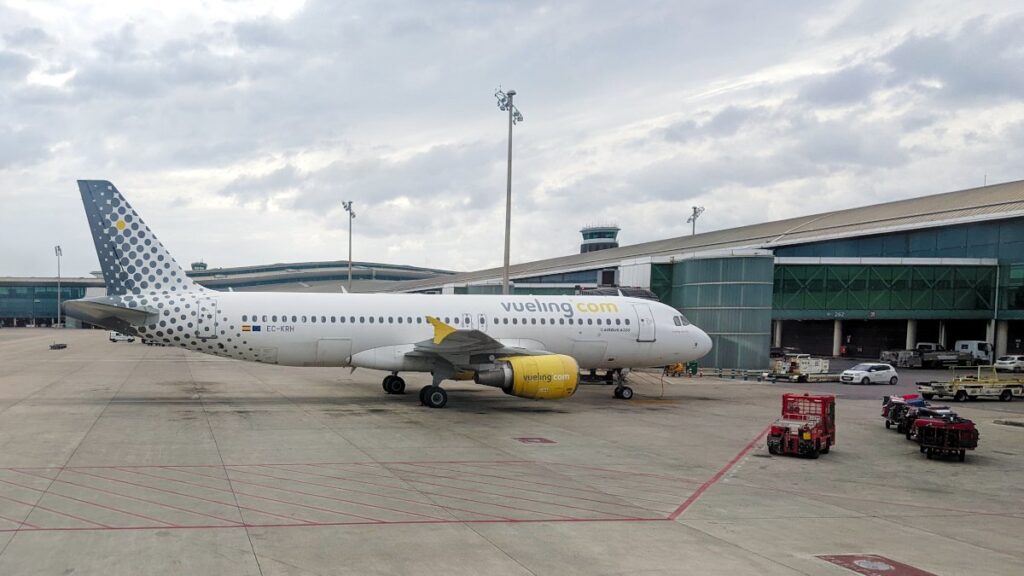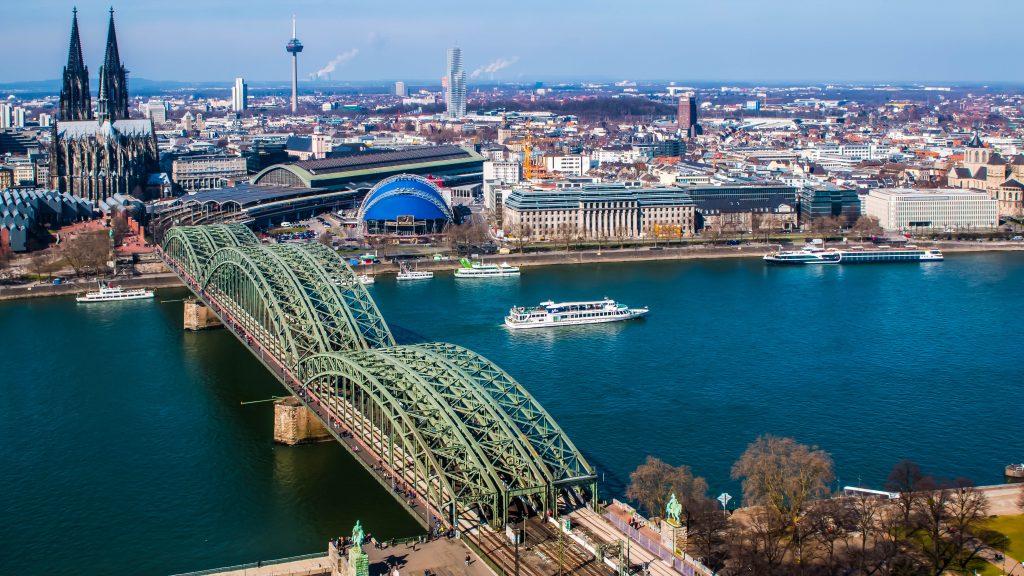As soon as you start planning your European adventure, you’ll realise that you will be going to train travel heaven. There’s no need for waiting at airports or searching for cheap flights as the train network in Europe is excellent. You can get almost everywhere by train. Here are our tips to make travelling by train in Europe even easier.
Travelling by train is fun and can even be just as affordable as travelling by plane. It may not be as fast as flying, but when you add the time it takes to travel to the airport, the checking in, waiting to board, and then waiting for your luggage to arrive, travelling by train is a great alternative.
And you'll meet all kinds of interesting people on board a train. Let’s look at the train system in Germany and see what it’s like to travel in Germany by train.
How long does it take to travel in Germany by train?
Even in a big country like Germany, travelling by train is easy and fast. Especially because the German rail company – DB aka Deutsche Bahn – operates lots of high-speed/fast trains between big cities and on long trips. Not just in Germany but also in neighbouring countries like the Netherlands, Austria, Switzerland and more.
Take a look at these travel times and see how quickly you can go from A to B by train in Germany.
- From Osnabrück to Berlin: 3 hours
- From Cologne to London: 4 hours
- From Düsseldorf to Berlin: 4 hours
- From Munich to Berlin: 4.5 hours
- From Munich to Dresden: 5 hours
- From Berlin to Amsterdam: 6 hours
Check out this handy planning tool to plan the ultimate train trip in Germany or beyond. It is so easy to book it all by using a European train pass.
It’s easy to see Germany by train… Emphasis on the seeing part as you’ll see heaps when you travel through Germany by train. Make sure you travel by day through Germany if you want to enjoy the scenery. Or choose a night train or one late in the evening if you just want to sit and relax, and maybe do some work. Travelling by train is perfect for digital nomads as it is so much easier to get work done on a train than on a plane.
How to save time & money on your German train ride
If you are wondering if train tickets in Germany are expensive or cheap, and where to get them, all these questions will be answered here. We've listed the ultimate tips for finding the best deals and even cheap tickets to travel by train in Germany.
Book your train ticket in advance
Booking a train ticket is basically the same as booking a plane ticket. The same pricing strategies are being used by train companies, the earlier you book, the lower the price. Last-minute tickets are always more expensive. The cheapest tickets are available well in advance, so book them as soon as you spot them. Check out the current deals & discounts on train tickets in Germany.
Be flexible
If you don't have to be in Berlin (or any other German city) at a specific date or time then play around with your departure and return dates. It pays to check what the prices are when arriving a day earlier or later. Keep in mind that on weekdays and in the middle of the day, train ticket prices are usually lower. It’s the same when hunting for cheap flights.
Make a seat reservation
It will cost you a few euros extra when making a seat reservation on the official Bahn website, but you gain a lot from it. Especially when you're travelling a long distance, with a group, or with heaps of baggage, a seat reservation makes everything so much easier. Trust us, there aren't many non-reserved seats left in German trains. When we travelled to Berlin we saw people without a seat reservation switching seats at almost every train station, because they got “kicked out” of the seats as they were reserved and the owner(s) showed up.
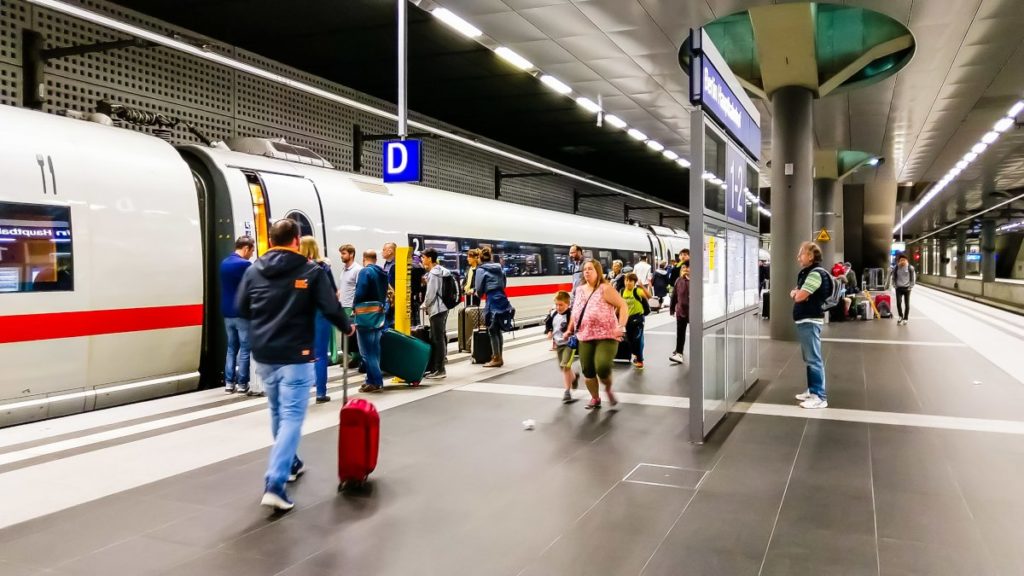
Use a German or European rail pass
A rail pass is perfect when visiting a lot of different cities or travelling a lot by train. These rail passes allow you to take X number of train rides within a certain time frame. Check out these rail passes and see how easy it is. And how much you will save on your travel plans.
Where to buy a ticket for your German train trip?
As mentioned before, it pays to book your German train ticket in advance. You’ll save heaps as you’ll get a much better deal than when purchasing it at the train station. That goes for long-distance train rides in Germany or if you’re planning to do a multi-stop trip.
It is so easy to book your train tickets online. It also shows you the cheapest date & time combo for your trip. Make sure to check out the German rail passes as well as it can save you even more money on these multi-stop trips or holidays by train, the perfect alternative for a road trip.
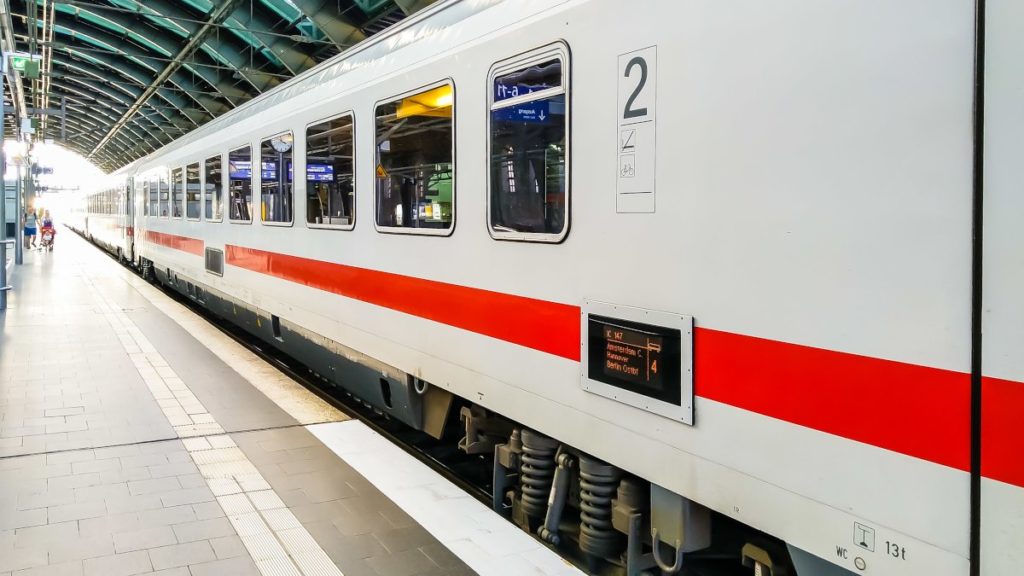
The only exception is the short train ride by regional trains aka the local rides. These usually take just a few stops so the tickets can be purchased from a machine at the station. Booking in advance only goes for long(er) trips on long-distance or high-speed trains.
Your carbon footprint will be super-low when using the train as your method of transport for your trip. Not just when compared to travelling by plane but also when compared to travelling by car. And it doesn’t have to cost you that much more. Travelling by train won’t break the bank if you plan your trip.
Different train types to and from Germany explained
When travelling to or through Germany by train, you’ll notice that there are many different trains and train services to choose from. Here’s your guide through the forest of German train abbreviations.
- ICE aka InterCity Express trains are high-speed trains in Germany. It is the fastest and most comfortable way of travelling on the German rail network. This train reaches speeds of up to 320 km/h (200 mph). ICE trains look sleek and modern and have a wide selection of comfy seats. There’s free wifi on board and you can go for special quiet zones if you prefer a nice and quiet trip.
- ICE Sprinter serves routes between major German cities and has fewer stops, meaning you’ll reach your destination faster.
- Intercity (IC) and Eurocity (EC) trains look more like regular trains and reach speeds of up to 200 km/h. They connect a wide variety of German and Internation cities and stop less frequently than regional trains but more often than ICE trains. The difference between IC and EC trains is that IC trains operate solely between German cities, while EC trains connect cities in neighbouring countries with German cities.
- Regional trains (DB Regional). Well, it’s all in the name. These trains connect cities and towns in Germany, run shorter distances and stop more frequently. They depart at regular intervals making travelling short distances or transferring to long-distance trains super-easy.
What to bring on your train ride in Germany & beyond
On almost all long-distance trains in Germany, there is a catering area/restaurant, but it's more expensive than purchasing food or drinks at the station before departure.
It's easier, cheaper, and much tastier to bring your own food and/or drinks. Simply make a stop at a supermarket and shop for groceries. Most big train stations in Europe have (small) supermarkets, so it's easy to stock up. Purchasing food at a supermarket in town is even cheaper but then you’ll have to carry it with you to the train station.
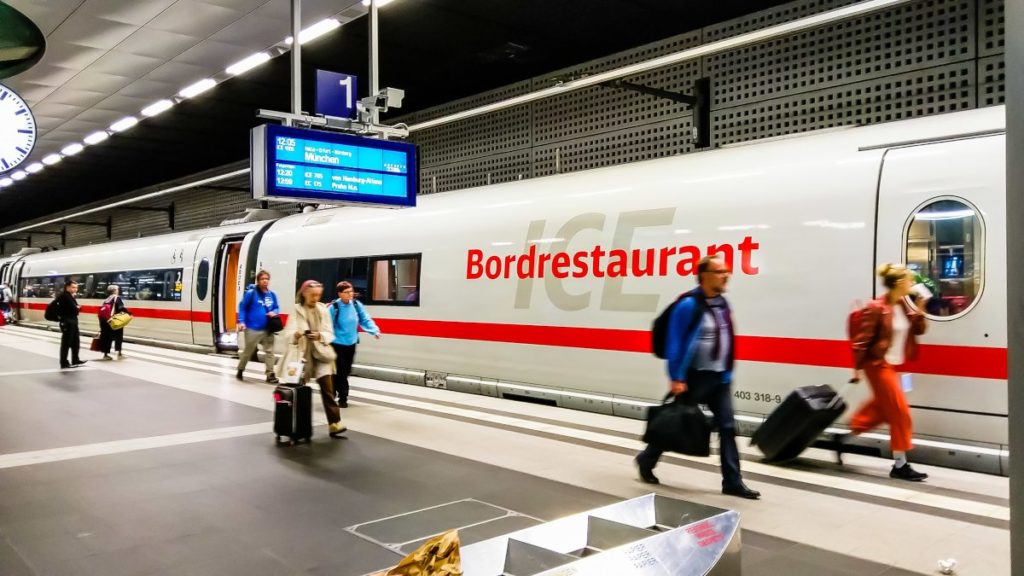
Germans do the same. Especially if you travel by train at the end of a day or the end of the week, you'll see people bringing rolls, sausages, bottles of wine or beer, and whatnot. Travelling by train through Germany feels like a picnic on wheels. Kinda like Friday Night Drinks on the go.
Bring your laptop, tablet or digital paper tablet if you want to get some work done. The long-distance trains in Germany (and most of Europe) have seats with a small table, perfect to work on your project or write a few blog posts.
Will you take the train on your next European adventure?
Are you planning to see more of Europe and to travel by train? Post your plans or questions in the comment section below. Let’s show everyone how easy it is to reduce your carbon footprint while travelling in Europe in a more fun & relaxed way. Train travel rules.



